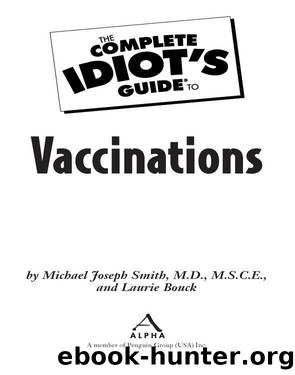The Complete Idiot's Guide to Vaccinations by Michael Joseph Smith

Author:Michael Joseph Smith
Language: eng
Format: epub
Publisher: Penguin USA, Inc.
When You Might Need It
Some members of the military, health-care workers, public health workers, and smallpox researchers already receive smallpox vaccinations. The one-dose vaccine is made from a live, attenuated virus that can create immunity to smallpox. There have been many versions of the smallpox vaccine in the past, but the current vaccine was licensed in 2007.
During vaccination, a person is quickly pricked several times with small needles. As the immune system reacts to the vaccine, the area where the vaccine was received blisters and scabs over. Until the scab falls off, special steps are needed to prevent the spread of the virus to others. The smallpox vaccination provides protection for 3 to 10 years, depending on the level of exposure to smallpox and related viruses.
In theory, some people should not receive this vaccination. People must be 18 years old or older to get the smallpox vaccination. In the case of individuals with heart problems, skin problems such as eczema or bad acne (or living with someone who has skin problems), or a weakened immune system from a disease or a medical treatment (or living with someone with a weakened immune system), the smallpox vaccination should not be given. Women who are pregnant (or individuals living with someone who is pregnant) or breastfeeding, or people who have severe allergies to latex or to the antibiotics polymyxin B, streptomycin, chlortetracycline, or neomycin should not get the vaccination. People might not be able to get the vaccinations if they have high blood pressure, high cholesterol, diabetes, relatives with certain heart conditions; take certain steroids; or smoke cigarettes.
If there were a smallpox outbreak, however, people might need to get the smallpox vaccine despite any risk factors they might have. In this case, the benefits of vaccination would probably outweigh the risks of catching smallpox, and public health officials would decide whether they needed to be vaccinated. If the vaccination is received within four days of being exposed to smallpox, it can often still protect a person from infection. If the vaccination is received four to seven days after exposure, it can diminish the effect of any smallpox infection.
Download
This site does not store any files on its server. We only index and link to content provided by other sites. Please contact the content providers to delete copyright contents if any and email us, we'll remove relevant links or contents immediately.
Vaccine Epidemic by Louise Kuo Habakus(1646)
The Vaccine Race by Meredith Wadman(1645)
The Vaccine Court by Rohde Wayne(1492)
On Immunity: An Inoculation by Biss Eula(1355)
The End of Breast Cancer by Kathleen T. Ruddy MD(1294)
Pox by Michael Willrich(1240)
How to End the Autism Epidemic by J.B. Handley(1174)
Children's Medicines by Edward A. Bell(1166)
The Speckled Monster by Jennifer Lee Carrell(1149)
Vaccine Epidemic: How Corporate Greed, Biased Science, and Coercive Government Threaten Our Human Rights, Our Health, and Our Children by Louise Kuo Habakus(1132)
The Health of Nations by Karen Bartlett(1119)
The Official Autism 101 Manual by Karen L. Simmons(1096)
Vaccines: A Reappraisal by Moskowitz Richard(1077)
Vaccine Injuries: Documented Adverse Reactions to Vaccines by Lou Conte Tony Lyons(1067)
Vaccines Did Not Cause Rachel's Autism by Peter J. Hotez(1055)
Arrowsmith (1925) by Sinclair Lewis(1023)
The Vaccine Debate by Tish Davidson(992)
Understanding Hepatitis by Naheed Ali(919)
Callous Disregard: Autism and Vaccines: The Truth Behind a Tragedy [2010] by !!! Andrew J. Wakefield(888)
